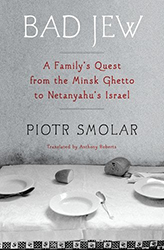Before All the World is presented as a book written by Gittl, a Jewish poet and refugee, and translated by Charles, a Black writer. The novel begins in 1930s Philadelphia with an encounter between Charles and the soft-spoken Leyb, a young man who is wary of the strange home he calls “amerike.” Charles, though, knows Yiddish, and he’s familiar enough with the local speakeasy to suggest that Leyb kiss him in its back room. At the same time, Gittl makes her way to America fourteen years after she and Leyb are the sole survivors of a pogrom in their village. Guided by a chorus of her lost siblings’ voices, Gittl finds Leyb and, with him, the strength to reckon with the past in order to envision a future.
Translation serves an important narrative role throughout the book’s pages. Rothman-Zecher creatively uses footnotes to reveal certain editorial choices and linguistic sources. For those Yiddish words and phrases that are not accompanied by a footnote, the reader becomes a partner in translation. One need not be familiar with Yiddish, though, to laugh out loud at turns of phrase like “the talking overmustache” — in reference to, as Gittl dubs him, “Neitzsche’le” — or to nod in recognition at lines like “a godthing from a dustdrawer” or “awaychasing into the darksome night.”
What is particularly admirable about the use of language is that Rothman-Zecher showcases Yiddish — both its sweetness and its roughness — without fetishization. “All tongues are the same upground humanfish, I think,” Gittl suggests to Charles. “There is no such holy mamatongue what helps any person to do anything or be anything, or what keeps a person from anything.”. Yiddish is the lingua franca of this world, but it is not the only way to communicate. Indeed, the novel depicts, without hierarchy, many forms of communication: the Yiddish Charles sprinkles throughout his English; the way Gittl communes with the voices of her murdered siblings; scenes of poetry as activism. To be human is to translate, to weave intricate pathways for others to follow and help shape. This, Rothman-Zecher suggests, is love.
One of the novel’s most memorable scenes watches as Gittl memorializes the murdered Jews of her village. She spends pages recounting their qualities or, for those whose names she does not know, simply acknowledging that they existed. As the chorus of her siblings surrounds her, one voice admits, “I don’t understand.” “It’s okay Zimml to not understand I also don’t,” a voice answers. A lack of understanding will occur, Before All the World reminds the reader — whether in the process of reading translated Yiddish or fully processing the devastating impact of racism. In these instances, the reader is given permission to admit confusion and encouraged to continue. The most powerful act of translation, according to the novel, is listening.
At its core, Before All the World considers one essential question: what does it mean to remember the past while still imagining the future? While the novel doesn’t provide a clear-cut answer, it does insist that those who’ve suffered great indignities have a duty to support fellow marginalized people. Its most striking accomplishment is its invitation to the reader to become a part of the novel’s chorus. What will you do, it asks, now that you’ve read this story?
Adina Applebaum is a Program Associate at the Whiting Foundation. She lives in New York.






